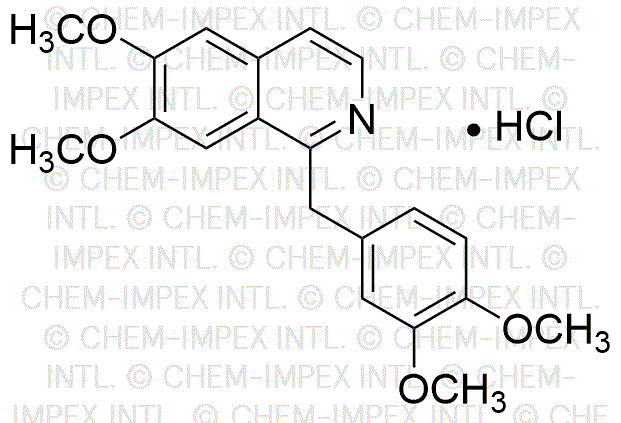Papaverine hydrochloride is widely utilized in research focused on:
- Vasodilation Therapy: Commonly used in the treatment of vascular disorders, it helps to relax and widen blood vessels, improving blood flow in conditions like peripheral vascular disease.
- Gastrointestinal Disorders: Employed to alleviate spasms in the gastrointestinal tract, making it beneficial for patients suffering from conditions like irritable bowel syndrome.
- Neurological Research: Investigated for its potential neuroprotective effects, it is being studied for applications in treating conditions like stroke and other neurovascular disorders.
- Pharmaceutical Formulations: Often included in combination therapies for its muscle-relaxing properties, enhancing the efficacy of other medications in pain management.
- Cardiovascular Studies: Used in clinical research to explore its effects on heart function and blood pressure regulation, providing insights into cardiovascular health.
General Information
Properties
Safety and Regulations
Applications
Papaverine hydrochloride is widely utilized in research focused on:
- Vasodilation Therapy: Commonly used in the treatment of vascular disorders, it helps to relax and widen blood vessels, improving blood flow in conditions like peripheral vascular disease.
- Gastrointestinal Disorders: Employed to alleviate spasms in the gastrointestinal tract, making it beneficial for patients suffering from conditions like irritable bowel syndrome.
- Neurological Research: Investigated for its potential neuroprotective effects, it is being studied for applications in treating conditions like stroke and other neurovascular disorders.
- Pharmaceutical Formulations: Often included in combination therapies for its muscle-relaxing properties, enhancing the efficacy of other medications in pain management.
- Cardiovascular Studies: Used in clinical research to explore its effects on heart function and blood pressure regulation, providing insights into cardiovascular health.
Documents
Safety Data Sheets (SDS)
The SDS provides comprehensive safety information on handling, storage, and disposal of the product.
Product Specification (PS)
The PS provides a comprehensive breakdown of the product’s properties, including chemical composition, physical state, purity, and storage requirements. It also details acceptable quality ranges and the product's intended applications.
Certificates of Analysis (COA)
Search for Certificates of Analysis (COA) by entering the products Lot Number. Lot and Batch Numbers can be found on a product’s label following the words ‘Lot’ or ‘Batch’.
*Catalog Number
*Lot Number
Certificates Of Origin (COO)
This COO confirms the country where the product was manufactured, and also details the materials and components used in it and whether it is derived from natural, synthetic, or other specific sources. This certificate may be required for customs, trade, and regulatory compliance.
*Catalog Number
*Lot Number
Safety Data Sheets (SDS)
The SDS provides comprehensive safety information on handling, storage, and disposal of the product.
DownloadProduct Specification (PS)
The PS provides a comprehensive breakdown of the product’s properties, including chemical composition, physical state, purity, and storage requirements. It also details acceptable quality ranges and the product's intended applications.
DownloadCertificates of Analysis (COA)
Search for Certificates of Analysis (COA) by entering the products Lot Number. Lot and Batch Numbers can be found on a product’s label following the words ‘Lot’ or ‘Batch’.
*Catalog Number
*Lot Number
Certificates Of Origin (COO)
This COO confirms the country where the product was manufactured, and also details the materials and components used in it and whether it is derived from natural, synthetic, or other specific sources. This certificate may be required for customs, trade, and regulatory compliance.


